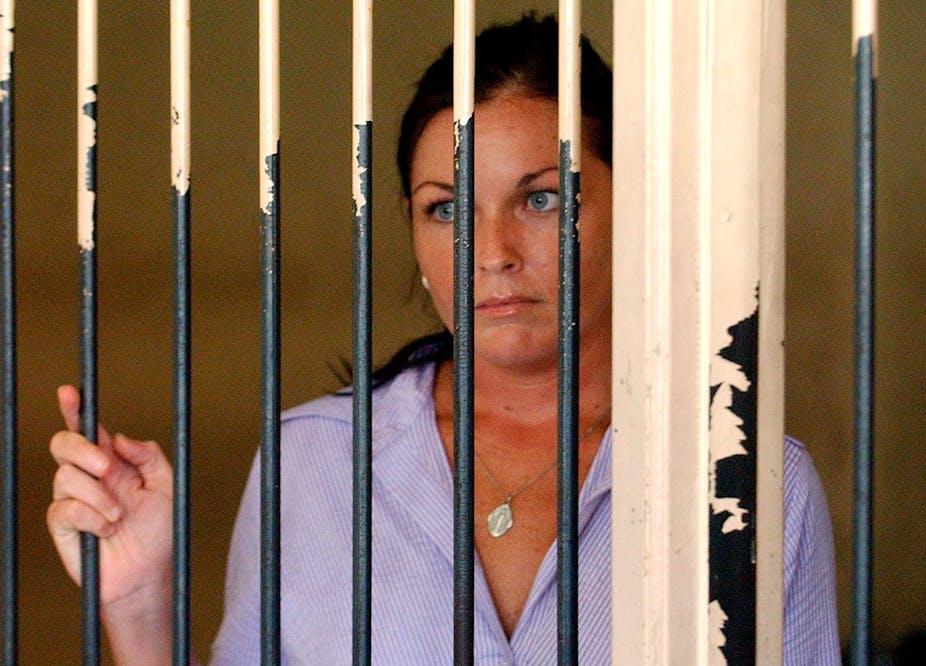Schapelle Corby’s fate may be the centre of public attention in Australia, but not here in Indonesia where I currently live and work. The hot topic here for the past few days has been whether or not Lady Gaga will be permitted to perform at a concert in Jakarta next month.
Corby’s case simply does not have the resonance in Indonesia that it does in Australia. I suspect few Indonesians believe she is innocent; she is commonly referred to in the media as the “Marijuana Queen”.
The current interest in the case – to the extent that there has been one – is on suggestions that a deal had been done with the Australian government, linking Corby’s remission with the freeing of Indonesians currently held in Australian jails.
The Minister for Justice and Human Rights, Amir Syamsuddin, is quoted as saying he hoped Australia would reciprocate Indonesia’s actions in the Corby case, particularly in terms of Indonesian children in Australian prisons. “The Australian government has not promised anything”, he said, “but we hope there will be a positive response from the Australian government.”
Australian government denials of any such deal, made by both Foreign Minister Bob Carr and Attorney General Nicola Roxon, have also been reported, though to what extent they are believed is anyone’s guess.
Whether this presidential decision means anything for other Australians in Indonesian jails on drugs charges is unclear. If there is little public sympathy evident for Corby, there is virtually none for those convicted of more serious drug offences.
Decisions on remissions or pardons in such cases are essentially political ones. And while public opinion is clearly not the final arbiter, it is an important contributing factor.
Indonesia holds national presidential and parliamentary elections in 2014. President Susilo Bambang Yudhoyono (SBY) cannot himself stand for another term as president, having reached the constitutional limit of two terms. But he will want to try to ensure his successor will be someone sympathetic to his own aims and interests.
He will also want to try to boost the parliamentary representation of his party, Partai Demokrat.
But this will be a tough task. All the current indications are that both Yudhoyono personally and Partai Demokrat in general are in trouble with the electorate. Socially and probably politically, the electorate is becoming more conservative, led in particular by groups presenting themselves as defending traditional Islamic values against the allegedly “liberal” values promoted by SBY and his government.
In the past, Yudhoyono has shown no inclination to take on such groups, even on issues of direct significance to Indonesians, such as violence against religious minorities. He is hardly likely to take the political risk of doing so on an issue where the beneficiaries are foreigners – and drug traffickers at that.
Already he has been criticised for even considering Corby’s clemency appeal.
A senior member of parliament from the Islamist Prosperity and Justice Party (PKS), Nasir Djamil, said last month – when the possibility of a remission was being discussed – that he hoped the government would not grant a remission. Such an action, he said, would do nothing dissuade “other Australians who wanted to distribute narcotics in Indonesia”.
Further, as Hikmahanto Juwana from the University of Indonesia observed today, the president cannot afford to be seen to be weak in the eyes of the Indonesian public, given it is well-known that Australia has been exerting pressure on Jakarta on the Corby issue for quite some time.
So politically, SBY’s hands may well be tied.
But there is another important issue underlying this case, which affects the relationship between Australia and Indonesia: human rights.
In Indonesia, Australia’s reputation on human rights issues is a decidedly mixed one.
We are seen to protest loudly when our citizens are jailed in Indonesia, following due Indonesian legal process.
However as most Indonesians now know, for years Indonesian children were held in adult prisons in Australia, in clear violation of Australian law as well as Australia’s international obligations.
Were it not for the agitation of a few Australians, notably Ross Taylor and Colin Singer from Perth, these children would probably still be in jail, their causes unheard. Only after the issue began attracting media attention did the government act – and then only grudgingly.
This is in stark contrast to the government’s reactions to the holding of an Australian boy in Bali last year on a charge of possession of marijuana: both the then Foreign Minister and the Prime Minister involved themselves personally – and very publicly - in the case.
We urge the commutation of death sentences on Australians convicted of drug smuggling in Indonesia. But we call for the execution of those convicted of terrorism offences.
We cannot have it both ways. If we are not consistent in our application of human rights principles in Australia, we can hardly criticise Indonesia if it is not consistent either.

